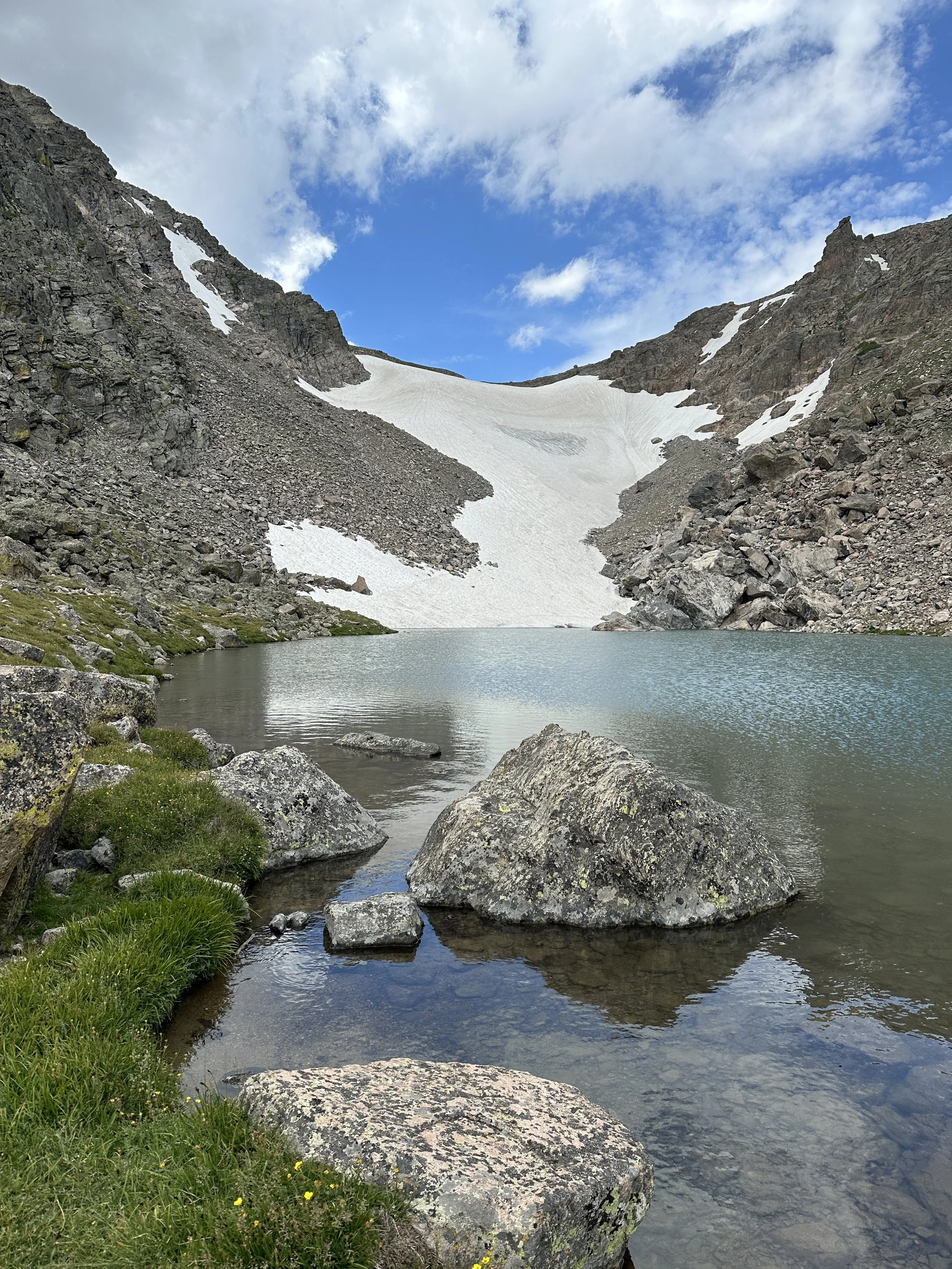
Listen softer.
Articles about Christian Spiritual Formation, Soul Care, and Life with God
Do you care, Jesus?
Standing at the top of Andrews Glacier in Rocky Mountain National Park is both exhilarating and daunting. My day turned into a much longer adventure when I decided to hike over to this glacier instead of returning on the same trail I originally ascended hours earlier. Thankful for cell service, I took a picture from the top and sent it to Rebekah. “Just want you to know I’m attempting to descend Andrews Glacier. So you know where I am.”
Rebekah later told me she could tell I was nervous just from my message. She was right.
It’s an incredible gift to know that someone cares whenever we’re facing hard or scary things. Healthy relationships, in fact, are built on our shared human desire to know and be known by someone. In fact, it’s said that we’re looking for someone looking for us.
Even though I was hiking alone, I was glad to know that Rebekah cared about where I was and what I was facing. She wasn’t too sure about my sanity, but she cared, nonetheless. If I didn’t come home that night, Rebekah would be looking for me.
Reflecting on that final day of my Sabbatical, I remember a pervasive feeling of being “hemmed in” and surrounded by God’s love. I wasn’t alone at all - my friend, Jesus, was hiking with me. There was a deep delight and joy in sensing that I was known and cared for by the God who knit me together in my mother’s womb.
You might recall a time when you felt the loving presence of God so real and tangible that you could practically touch it, taste it, and take it in. Do you remember how comforting and freeing it was to know that the God of the Universe truly cares for you?
You also might know what it’s like to move directly from those consolations to feelings of hopelessness, abandonment, disillusionment, desolation and discouragement. How quickly we forget what we just experienced as good and beautiful and true. The struggles and questions of our real world experience leave us feeling as if we have been forgotten. And in our despair we cry out to Jesus, “Do you care?”
Being with Jesus
I know quite a few married couples who have not only survived but thrived in their relationships with the frequent use of a “Honey-Do” list. I’m always impressed to hear how they negotiate the countless things that need to be done in and around the house by simply writing them out and getting to work.
“Honey-Do” lists don’t really work in our home. I think I have a lifelong aversion to chore lists. Thankfully, Rebekah and I have managed to work through my issues and have found other ways to share what needs to be done.
It’s not a question of our desire to serve one another. There’s nothing better than Rebekah coming home after several days out of town and learning that I watered her flowers while she was gone. She could’ve asked, and I probably would’ve complied, but it’s so much sweeter when we recognize and participate in little acts of service with great love…without being asked or told.
Because we are relational beings, created in the image of a relationally constituted God, we are always engaged in the process of navigating and negotiating the conditions of what we consider healthy relationships. We instinctively know what loving relationships entail - care, communication, commitment, cooperation and companionship. Equally true, we all have more than our fair share of unhealthy relationships to, hopefully, learn from. In the process of healing and growth we discover the kind of people we want to be and the kind of people we want to be with. Our “doing for” comes freely and naturally when we finally know who we are and who we’re with.
The same is true in our relationships with God. There’s a big difference between doing a lot of good work for God and learning how to consistently “be with” God and live out of the overflow. It’s a different posture, to be sure. One I’m not sure we’re comfortable naming, let alone practicing.
In the Waiting: Psalm 24
Have you heard the good news? The King of Glory is coming!
Who is this King?
He’s the LORD, strong and mighty. He’s the God of Angel Armies. He’s the Creator of the earth and sky and all that exists - everything, everwhere - world without end.
“The earth is the Lord’s and everything in it, the world and all its peoples belong to him.” (Psalm 24:1 NLT)
He’s the Faithful One who called Abraham and Sarah and promised more descendants than could ever be counted.. He came through on his promise and a nation was born through “King-Glory’s” covenant. He’s the Redeemer and Rescuer who delivered the Israelites from the Pharoah and brought them out of Egypt. He’s the Great I Am who came near to Moses and revealed himself as “Yahweh! The LORD! The God of compassion and mercy…slow to anger, filled with unfailing love and faithfulness.” (Ex. 34:6)
He’s Immanuel (God With Us) who enters our darkness with love’s piercing light. ‘He lavishes unfailing love to a thousand generations, forgiving iniquity, rebellion and sin.’ (Psalm 34:7a)
Our coming King is holy and just - without sin. Who can stand in his presence? Yet he took on flesh and became a “friend of sinners,” showing us that union with Love’s Family is possible, not by our doing but by God’s amazing grace.
Wake up, you sleepyheard city!
Wake up, you sleepyhead people!
King-Glory is ready to enter. (Psalm 24:7 The Message)
In the Waiting: Psalm 23
I’ve been waiting for this day! Psalm 23 has been a sure guide for my soul over the years. When I started my Advent journey of meditating (and writing) on a Psalm a day, I mentally circled this day on the calendar.
Dallas Willard’s book, “Life Without Lack,” will be the text book for my time with God today. As I type out his words, unpacking the phrases of the 23rd psalm, I pray the Holy Spirit will do a restoring work in me.
My heart is overflowing with joy as I dwell in the presence of Jesus, my good Shepherd. As I anticipate Christmas day, I want all the parts that make me who I am to be brought closer still. I’m making my way to the Holy Child in Bethlehem. Along with the Shepherds, I rejoice at the proclamation of Christ’s birth. I must go see for myself.
(The following is from Life Without Lack by Dallas Willard,, pp.xviii-xix)
The Lord is my shepherd.
In other words, I’m in the care of someone else. I’m not the one in charge. I’ve taken my kingdom and surrendered it to the kingdom of God. I am living the with-God life. The Lord is my shepherd. And what follows from that?
I shall not want.
That’s the natural result. I shall not lack anything. That’s what Jesus teaches: “Seek first the kingdom of God and His righteousness,” and everything else will be added (Matt.6:33).
He makes me to lie down in green pastures.
What kind of a sheep lies down in a green pasture? A sheep that has eaten its fill. If a sheep is in a green pasture and she’s not full, she’ll be eating, not lying down.
He leads me beside the still waters.
A sheep that is being led beside still water is a sheep that is not thirsty…
He restores my soul.
The broken depths of my soul are healed and reintegrated in a life in union with God: the eternal kind of life.
In the Waiting: Psalm 14
“A wicked and foolish man truly believes there is no God. They are vile, their sinfulness nauseating to their Creator; their actions are soiled and repulsive; every deed is depraved; not one of them does good.” (Psalm 14:1 The Voice)
I recently pulled G.K. Chesterton’s “Orthodoxy” off my bookshelf and jumped in with joy. I love his brilliant mind and playful exploration of Christianity. Here’s how one author summarizes Chesterton’s approach:
“Chesterton criticizes modern philosophers for erasing religion. Modern philosophies encourage people to over-analyze everything, including religion, and when we question something too deeply, we stop believing in it. He suggests that Christianity is simple enough to answer life’s questions while mysterious enough to keep us guessing.” (https://www.supersummary.com/orthodoxy/summary/)
As we sit with Psalm 14, we pick up on this same sentiment from David. The foolish person, in an attempt to be wise, actually thinks their way into believing God does not exist. As the psalm continues, the outline of the foolish person is filled in with the following complaints:
They are corrupt;
They only think of themselves;
They turn their backs and walk their own roads;
They use other people for their own gain;
They reject the reality of their Creator;
They laugh at those who put their trust in God;
They attempt to rationalize and reason away another person’s hope.
The conclusion of this list of grievances, Psalm 14:7, stands as a powerful rejection of this mad form of wisdom which leads to complete abandonment of faith.
In the Waiting: Psalm 13
Psalm 13 begins with another deep cry from the depths of David’s soul: “O Lord, how long will you forget me? Forever?” (v.1 NLT)
Perhaps, in an attempt for us to fully grasp the desperation of these first few verses, we need to go out to a solitary place and say the words ourselves. Maybe we need to groan them…or cry them out! We’re so familiar with the story of David, with the complaints and the raw emotions, that we’re actually less able to locate ourselves, and our circumstances, in the story.
No, not David’s actual story. Our story! Dietrich Bonhoeffer said it perfectly:
“Celebrating Advent means learning how to wait.… Not all can wait – certainly not those who are satisfied, contented, and feel that they live in the best of all possible worlds! Those who learn to wait are uneasy about their way of life, but yet have seen a vision of greatness in the world of the future and are patiently expecting its fulfillment.” (from Plough Daily Email, 2022.12.02)
David knows how to wait! Let’s not mistake his questions for a lack of patience. He’s willing to sit in the reality of what is, pay attention to the broad spectrum of emotions, name the emotions, bring them to God, and turn his lament into a declaration of God’s goodness.
Might this be a demonstration of emotionally healthy spirituality?
Here’s the pivot: “Turn and answer me, O Lord my God! Restore the sparkle to my eyes, or I will die.” (v.3)
Even as David is shifting from his very real turmoil, he’s counting on God to make the turn toward him. This deep awareness of a “vision of greatness in the world of the future” doesn’t happen by accident. We can’t really “will” ourselves into it. We must nurture this level of surrender across a lifetime of Advents!
“The celebration of Advent is possible only to those who are troubled in soul, who know themselves to be poor and imperfect, and who look forward to something greater to come. For these, it is enough to wait in humble fear until the Holy One himself comes down to us, God in the child in the manger.” (Bonhoeffer, ibid.)



